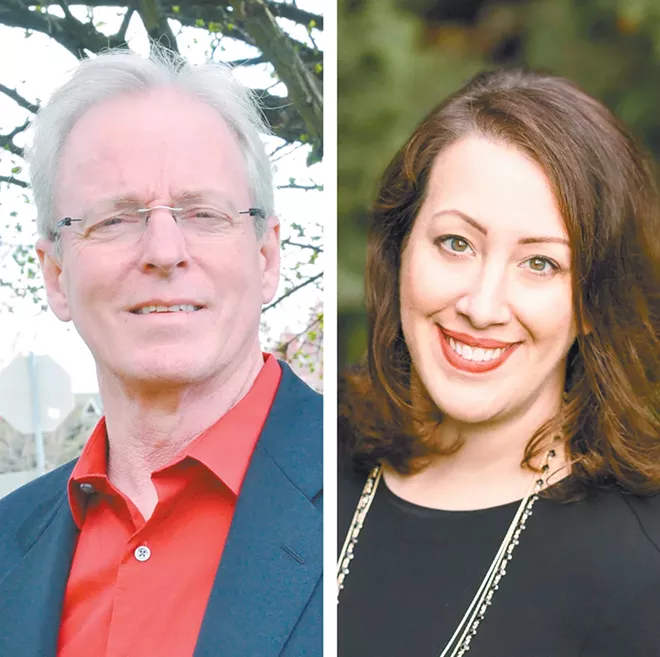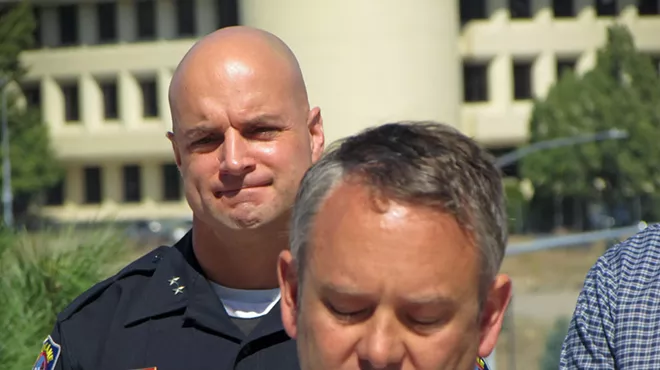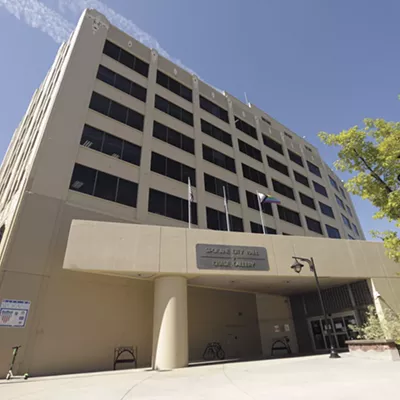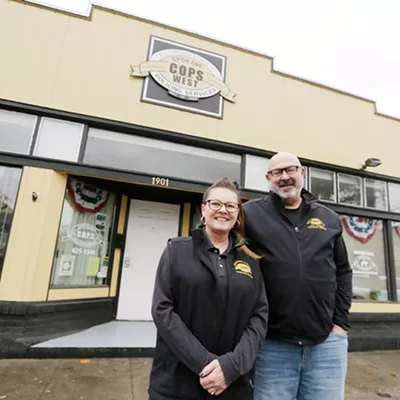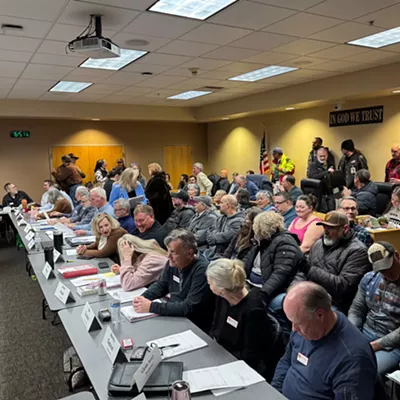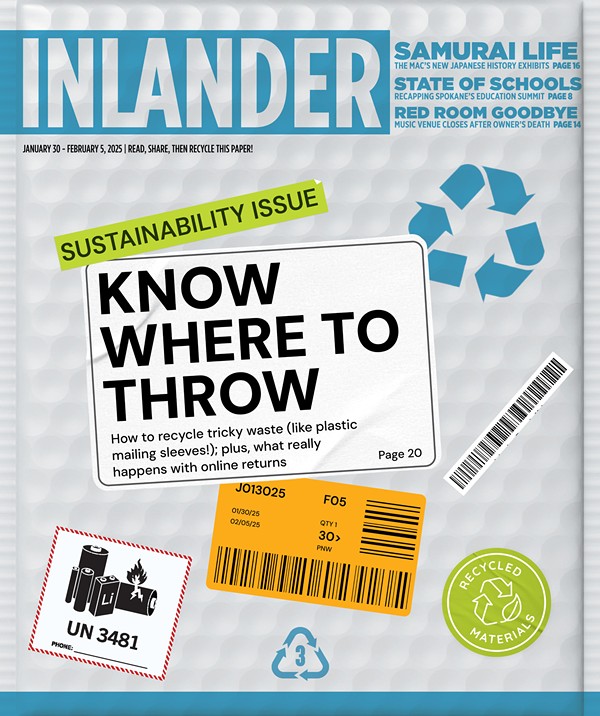
Four years ago, fresh off a victory to take a seat on Spokane City Council, Lori Kinnear had a moment to think about why she was able to beat her Mayor David Condon-backed opponent.
"I think my message was consistent," Kinnear told the Inlander in 2015. "I talked about property crime and funding the Fire Department and our neighborhoods."
Today? Kinnear says her message as she looks for re-election is an expanded version of her message four years ago. Only this time, issues like public safety and homelessness have become perhaps even more contentious.
In this summer's primary election for District 2, covering downtown and the South Hill, Kinnear is facing Liz Fleming, a real estate agent, and Tony Kiepe, a former health care consultant. Both opponents say part of the reason they're running is because of growing concerns that downtown Spokane has become unsafe.
But while public safety and homelessness remain top priorities for each candidate, they all differ in their approach.
LORI KINNEAR
Kinnear is aware of the growing perception that Spokane is less safe than it used to be. But she doesn't think that notion is supported by evidence.
"I think a lot of it is rhetoric," she says.
While public safety remains a top issue for her, she correctly notes that property crime numbers in Spokane have gone down since 2015, though not necessarily downtown. Kinnear, who serves as the chair on the City Council's Public Safety and Community Health Committee, hopes to continue working closely with the Police Department. Though she knows it's not ultimately her decision, she advocates for a community policing model that would feature more "boots on the ground" where officers can interact with the public. Kinnear adds that she voted for the public safety levy that added more firefighters and police officers.
Unlike her opponents, Kinnear refuses to link crime to homelessness.
"I think tying homelessness and crime together does a huge disservice, because it's not addressing the issues," Kinnear says. "If we're going to address homelessness, we need to look at victims of domestic violence that are homeless, at kids being aged out of foster care, at veterans with PTSD. And we need to be dealing with substance abuse and mental health issues."
Kinnear points to a resolution she sponsored to raise awareness of human trafficking, saying it's an example of her efforts to help the homeless. She admits, however, that funding the House of Charity as a 24/7 shelter downtown created a "dangerous situation."
"Having that model reduced so there aren't as many people there was certainly something that should have happened sooner," Kinnear says. "But lesson learned."
In the future, she says the city should focus on sheltering people where they live — not necessarily downtown. To that point, the council recently voted to approve the purchase of a new shelter on East Sprague. Moving forward, Kinnear hopes to find more ways to address mental health and substance abuse issues. The state Legislature providing money for more mental health beds in Spokane was a good start, she says.
"Let's go back to prevention and treatment rather than trying to stop it downstream," Kinnear says.
TONY KIEPE
While Kinnear is careful not to link homelessness to crime, Tony Kiepe has no such reservations.
"The biggest issue we have is public safety regarding homelessness," Kiepe says.
Kiepe acknowledges that the stats may say property crime is going down in Spokane. But those numbers don't match what he says he hears when he knocks on doors.
"Crime figures show our crime rates are down, but I think that's the way we're reporting. What do people really feel? It's not what a statistic says," Kiepe says.
Kiepe says Spokane is becoming a "little Seattle," because he feels Spokane supports drug habits on the streets. And Kiepe says many people don't feel safe downtown because of the homeless population.
His solution is a version of the popular motto to offer "a hand up, not a hand out." Except Kiepe's version would also tell a homeless person: "Or get out."
"I want to promote: If you want help, we'll get you help. But you've gotta want the help to get it. Or else we're cutting you off all funds, you're not wanted here in Spokane. Move on."
Kiepe says Spokane should add a new shelter. But he disagrees with the location of the property on Sprague that the city is planning to use for a new shelter. And he thinks there should be conditions for those wanting to access the shelter: namely, that those who use it are clean and sober. It should be similar in that way to the Union Gospel Mission model, he argues.
Kiepe dismisses concerns that eliminating low-barrier shelters could direct more homeless people to the streets. Again, he says if they don't like it then they can leave.
One area where Kiepe agrees with Kinnear is the levy that paid for additional police and firefighters. He voted for it. But he says the larger issue is that police officers have their hands tied because he says the Spokane County Jail is too small and can't hold all of the criminals. That's a decision that's out of the hands of the Spokane City Council. But if elected, Kiepe says he would launch an education campaign to encourage the construction of a bigger jail.
"How can we be more safe if we don't have a place to put our criminals?" Kiepe asks.
LIZ FLEMING
For Liz Fleming, who used to be the director of development for the Washington State University Elson S. Floyd College of Medicine, the moment inspiring her to run for City Council came almost two years ago.
That's when a friend of hers who decided to move into a downtown Spokane condo decided to move elsewhere because he didn't feel safe in Spokane.
"That didn't settle well with me," Fleming says. "I was born and raised in Spokane and that's not the Spokane I know."
Why don't people feel safe? That's a question Fleming says she's still trying to answer. She's met with social service agencies, law enforcement and downtown businesses who have seen property destroyed.
"I don't know if we can correlate that to homelessness," she says. "Some people say 'yes,' some people say 'no.' Some people chalk it up to addiction."
Fleming says there generally needs to be more "accountability." For her, that means not allowing open drug use, ensuring law enforcement has the resources they need to do their job, and enforcing the city's sit-lie law that bars people who are often homeless from sitting, sleeping or lying on the streets of downtown Spokane.
She voted for the public safety levy like her opponents, but she now says she doesn't know if she would today. While she wants to make sure law enforcement has the resources it needs, she thinks that money could have been found elsewhere in the budget without raising taxes.
She says a measure to update or build a new Spokane County Jail "needs to be looked at" with a public vote. At the same time, she says only the worst offenders should be sent to jail.
"I don't think incarcerating someone with a drug habit is beneficial for society," she says.
On homelessness, Fleming lies somewhere in the middle of Kiepe and Kinnear. She supports homeless services requiring those who use them be clean and sober, but also sees the value in programs offered by Catholic Charities that serve people who may not be sober.
"I believe in choosing to make the right decisions to get yourself on the right path," she says. "I also understand it can take five, six, seven, eight times before you can get sober ... if Catholic Charities can house chronic homeless and provide them services and eventually they're on the right path, I think that's a good decision." ♦

